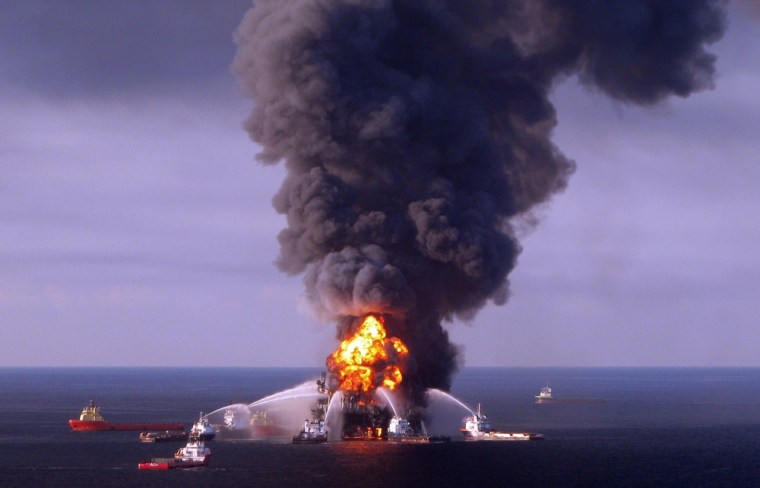Manslaughter and perjury are among possible charges that Justice Department investigators are exploring in the early stages of their probe into the Gulf oil spill, people familiar with the inquiry said Tuesday.
These people said the Justice Department is not ruling out the possibility of bringing manslaughter charges against companies or managers responsible for the explosion aboard the Deepwater Horizon drilling rig that killed 11 workers.
The department also is examining congressional testimony by company executives, including former BP CEO Tony Hayward, to determine whether their statements were untruthful, these people added.
They cautioned that the investigation is still far from complete and spoke on condition of anonymity about the ongoing investigation.
Justice Department spokeswoman Laura Sweeney declined to comment.
Earlier this month, the Justice Department reorganized its oil spill investigation. It created a unified task force so investigators from Justice's criminal and environmental divisions and from the U.S. attorney's office in New Orleans can coordinate overlapping work of looking into civil violations and criminal culpability, if any.
Deputy Attorney General James Cole ordered the move to avoid duplication of effort. Criminal division senior counsel John Buretta is leading the task force, and criminal division chief Lanny Breuer is supervising it.
The drilling rig explosion occurred on April 20, 2010. A month and a half later, Attorney General Eric Holder announced criminal and civil investigations of the disaster.
"We will closely examine the actions of those involved in the spill. If we find evidence of illegal behavior, we will be extremely forceful in our response," Holder said in New Orleans.
Bringing a manslaughter charge against a corporation is unusual but not unprecedented.
Two weeks after Holder announced the probe, Cole told Congress that prosecuting individual executives is the best deterrent when there is corporate misconduct.
Cole did not oppose charging corporations criminally, but added that doing so can unfairly penalize innocent shareholders and employees.
He added that charging any corporation is a sensitive subject within the Justice Department and that doing so can affect "thousands and thousands" of employees and shareholders with no role in the misconduct.
In the Enron scandal, Cole counseled Arthur Anderson LLP on revamping its document retention policies, then watched the accounting firm collapse after the Justice Department brought a criminal case.
In December, the Justice Department sued BP, oil rig owner Transocean and several other companies in the government's effort to recover billions of dollars for economic and environmental damage. BP was leasing the rig that exploded from Transocean. BP was majority owner of the well that blew out.
In January, a presidential commission found that the spill was caused by time-saving and money-saving decisions by BP, Halliburton and Transocean that created unacceptable risk.
One lawyer who has represented clients in the energy industry for over a decade, Anthony Michael Sabino, says a manslaughter charge would appear to be unlikely based on what is publicly known so far about events.
For example, in the run-up to the explosion on April 20, BP engineers, amid some debate, decided not to install as many devices called "centralizers" as originally planned, a decision that the presidential commission emphasized in its recent report.
"The key aspect of this is that's it's debatable as to how many of these devices were necessary, and the mere fact that there could be reasonable debate demonstrates that a criminal charge is probably not the wisest move, but rather left as a civil matter as to what level of negligence this constitutes, if any," said Sabino, who also is a law professor at the Tobin College of Business at St. John's University in New York City.
According to an ongoing lawsuit in Houston, Kevin Lacy, BP's former senior vice president for drilling operations for the Gulf of Mexico, reached a mutual agreement with the company to resign in December 2009 because Lacy believed the company was not adequately committed to improving safety protocols in offshore drilling operations to the level of its industry peers.
The suit said Lacy, an experienced drilling engineer who had implemented a rigorous drilling safety program while at Chevron, had been recruited to join BP in 2007 to improve and standardize its drilling policies and protocols.
Bloomberg News was first to report the possibility of a manslaughter charge by the Justice Department.
